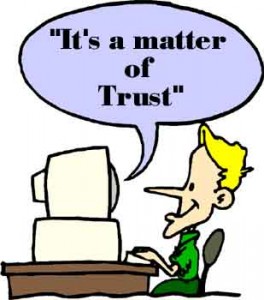By Rose O. Sherman, EdD, RN, FAAN
 The ability to build trust in relationships is essential in leadership. Yet not all leaders fully understand the impact of what happens when they are not trusted. I was reminded of this the other day when a young leader told me that she distrusted a leadership colleague because she often discussed with others conversations that should have remained confidential. She described the behavior as toxic to leadership group cohesion. In his business bestseller, “The Trust Edge: How Top Leaders Gain Faster Results, Deeper Relationships and a Stronger Bottom Line.”, David Horsager makes the important point that trust flows from individuals, not from organizations. Without trust, leaders lose influence and the ability to retain their team members and lose the confidence of their colleagues.
The ability to build trust in relationships is essential in leadership. Yet not all leaders fully understand the impact of what happens when they are not trusted. I was reminded of this the other day when a young leader told me that she distrusted a leadership colleague because she often discussed with others conversations that should have remained confidential. She described the behavior as toxic to leadership group cohesion. In his business bestseller, “The Trust Edge: How Top Leaders Gain Faster Results, Deeper Relationships and a Stronger Bottom Line.”, David Horsager makes the important point that trust flows from individuals, not from organizations. Without trust, leaders lose influence and the ability to retain their team members and lose the confidence of their colleagues.
As he researched organizations in his work, Horsager found that trust is the competitive edge shared by great leaders and great organizations. Trust, he suggests, doesn’t happen overnight. It is instead like a forest that grows over time but can be burned down with acts of carelessness. In his work, Horsager has identified the eight pillars of trust that are key attributes of successful leaders:
1. Clarity: People trust the clear and mistrust the ambiguous.
2. Compassion: People put faith in those who care beyond themselves.
3. Character: People notice those who do what is right over what is easy and who don’t betray confidences.
4. Competency: People have confidence in those who stay fresh, relevant, and capable.
5. Commitment: People believe in those who stand through adversity.
6. Connection: People want to follow, buy from, and be around friends.
7. Contribution: People immediately respond to results.
8. Consistency: People love to see the little things done consistently.
Horsager suggests that when leaders learn how to implement these pillars, they enjoy better relationships, reputations, retention, revenue, and results. The Trust Edge unveils how trust has the ability to accelerate or destroy any business, organization, or relationship. The lower the trust, the more time everything takes, the more everything costs, and the lower the loyalty of everyone involved.
This work is important today in health care where there is so much uncertainty and trust in fundamental to the work of nursing. The trusted leader is followed. Trust must be there in relations with both staff and colleagues. A loss of trust can lead to the toxicity that this young leader described to me. It is trust and not money, that is the currency of leadership.
Read to Lead
Horsager, D. (2012). The Trust Edge:How Top Leaders Gain Faster Results, Deeper Relationships and a Stronger Bottom Line. Free Press.
© emergingrnleader.com 2016


 LinkedIn
LinkedIn Instagram
Instagram